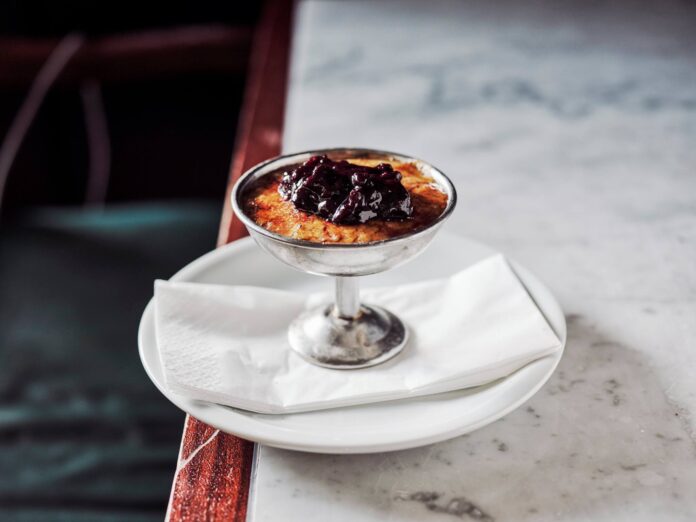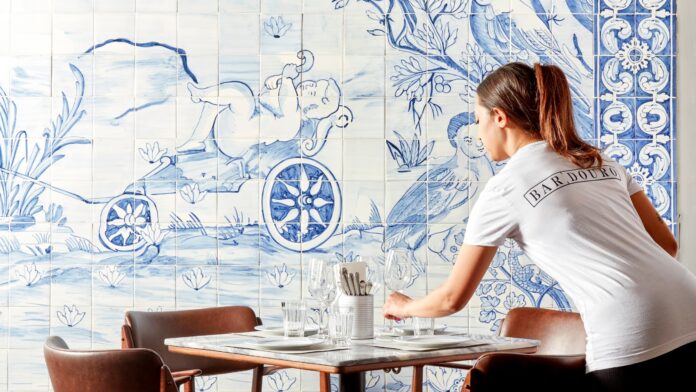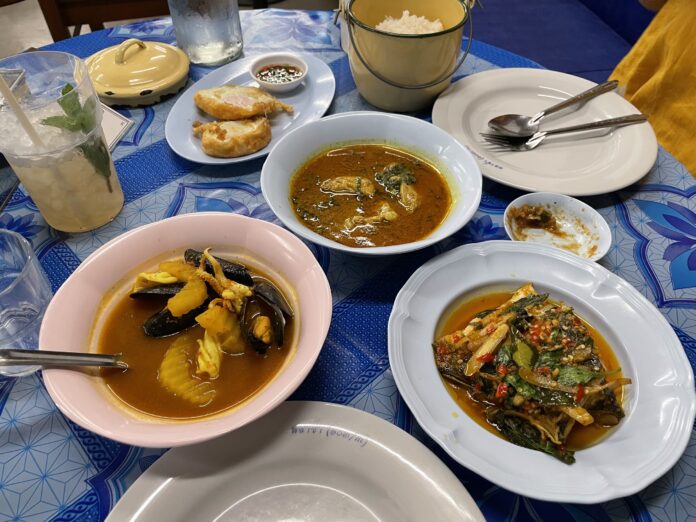As a cocktail bar owner or mixologist, incorporating sustainable practices into your establishment is not only an ethical decision but also a smart business move.
According to a recent survey conducted by YouGov, over two-thirds of Gen-Z consumers in the UK are willing to pay more for food and drink that is produced sustainably. The figure for millennials was similar. These much sought-after age groups, the most likely to spend big in bars and clubs, said they would be happy to spend more on food and drink that is environmentally friendly.
With more and more consumers prioritising eco-conscious choices, it’s time to elevate your cocktail bar’s green game, which, perhaps unsurprisingly, may well also help your drinks taste a whole lot fresher. Here are 10 eco-friendly ideas that will ensure your cocktail bar is on the cutting edge of sustainability.
Agave Straws
Say goodbye to single-use plastic straws and hello to agave straws! Made from the fibrous byproduct of the agave plant, these straws are biodegradable, compostable, and incredibly stylish. Not only do they add an earthy touch to your cocktails, but they also contribute to a cleaner planet.
If you can’t use agave straws for reasons of availability, alternatives include:
- Bamboo straws – These natural straws are made from bamboo stalks, which are a sustainable and renewable resource. Plus, they’re reusable and can be easily cleaned with a brush or in the dishwasher.
- Glass straws – Reusable glass straws are a beautiful and elegant option that adds an extra touch of class to your cocktails. They’re easy to clean and come in a variety of styles and patterns.
- Stainless steel straws – If you’re looking for a sturdy and reusable option, stainless steel straws are a great choice. They’re durable, easy to clean, and can be used over and over again.
- Paper straws – While paper straws are still a single-use item, they’re a great alternative to plastic straws. They’re biodegradable and can be recycled, making them a more eco-friendly option.
- Edible straws – For a fun and unique twist, consider using edible straws made from materials like pasta, candy, or fruit. Not only are they a sustainable option, but they also add an extra flavour and texture to your drink.
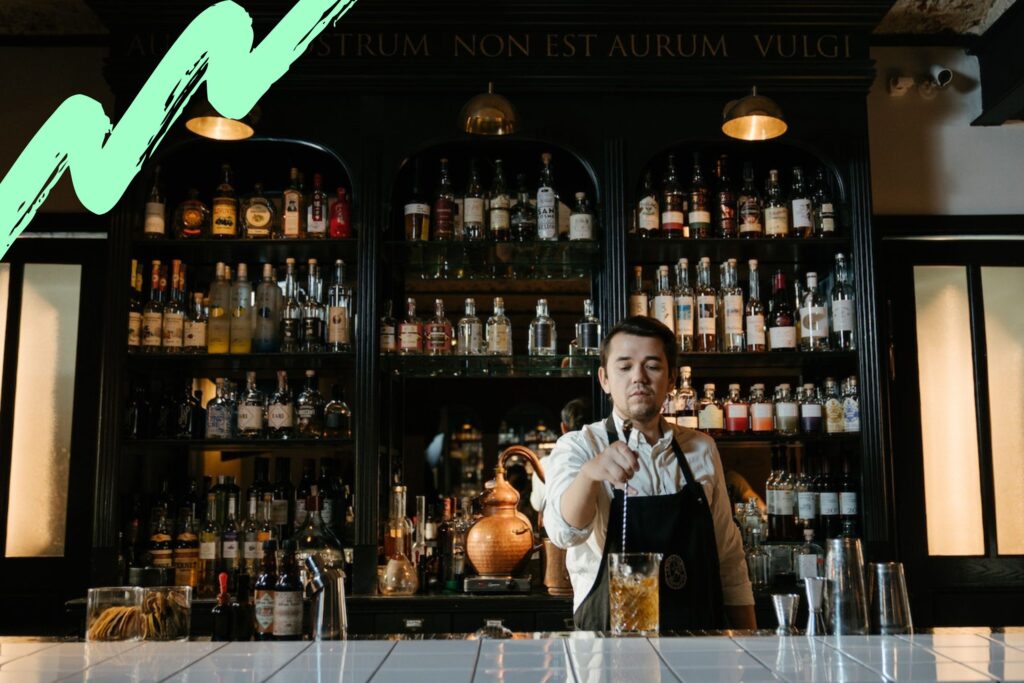
Recycled Water
Innovative water-saving technologies, such as the use of recycled water for cleaning and ice-making, can significantly reduce your bar’s water footprint. By utilising greywater systems, which collects and purifies water from sinks and dishwashers to be reused for non-potable purposes like flushing toilets and irrigation, you’ll conserve precious resources while maintaining the highest hygiene standards
Just as important, though admittedly a little more ‘analogue’, is using recycled water for various daily tasks in the bar. Staff can, for instance, recycle water by collecting the ice that melts, purifying it, and using it to water plants or flowers, as well as using it for cleaning..
Solar-Powered Equipment
Harness the power of the sun to run your cocktail bar! Invest in solar panels and energy-efficient equipment to minimise your establishment’s carbon footprint, reduce energy costs, and contribute to a cleaner and greener planet.
Solar panels installed on the rooftop or the facade of the bar absorb sunlight and transform it into electricity to power the equipment and appliances used in the bar.
At a cocktail bar, various equipment such as refrigerators, ice machines, blenders, and lighting consume a significant amount of electricity. Using solar-powered equipment can help lower these energy costs and reduce emissions; take about killing two birds with one stone! Actually, don’t, that wouldn’t be very sustainable…
Anyway, solar-powered equipment may actually represent a decent investment in the long run. Solar panels require minimal maintenance and can last for over 20 years. Thus, investing in solar-powered equipment is not only environmentally-friendly but also economically sound. Now, let’s hope we’ve left a few coins down the back of the sofa…
Upcycled Glassware
Instead of investing in brand-new glassware, consider using upcycled glasses made from reclaimed wine, beer and spirits bottles. These unique pieces not only make a statement but also help reduce waste in landfills. Plus, they serve as excellent conversation starters!
The ubiquitous repurposing of glassware is another great way to keep your bar’s carbon footprint lower. We’ve all seen Mason jars used as a quirky vessel for a cocktail in one of London’s hipster-adjacent bars, but think beyond this, and deploy laboratory beakers, light bulbs (ouch!) and other unusual glass items as your glassware.
For inspiration, check out the restaurant Silo, one of our favourite restaurants in Hackney Wick, and a place that has been pioneering the idea of upcycling for several years now.
Organic & Locally-Sourced Ingredients
Elevate your cocktails (and your eco-credentials) by only using organic and locally-sourced ingredients. This approach not only supports local farmers and reduces transportation emissions but also ensures that your patrons enjoy the freshest, most flavourful drinks possible.
A few simple swaps that use UK-grown products instead of global ones include:
- Sea buckthorn instead of lime: Sea buckthorn is a fantastic citrus alternative that grows abundantly on the UK coast. This tart and tangy fruit is an excellent substitute for lime in cocktails and can also be used in syrups and shrubs.
- Blackcurrant instead of cranberry: Blackcurrant is another fruit that grows well in the UK and offers a tart flavour similar to cranberry. Using blackcurrant instead of cranberry in cocktails and mixers can reduce the carbon footprint of your drinks.
- Elderflower, bang in season soon, instead of St Germain: St Germain is a French elderflower liqueur that is commonly used in cocktails. However, using UK-grown elderflower instead can reduce the need for imported ingredients and support local farmers.
- Rhubarb instead of grenadine: Grenadine is a popular ingredient in cocktails and is typically made from pomegranate juice. However, using UK-grown rhubarb instead can create a similar sweet and sour flavour profile while supporting local agriculture.
- Rosehip instead of hibiscus: Hibiscus flowers are commonly used in cocktails and produce a deep red colour. However, UK-grown rosehips can be used instead, creating a similar colour and flavour profile while reducing the environmental impact of imported ingredients.
- Meadowsweet instead of vanilla: Vanilla is a classic flavour in desserts and cocktails, but it is typically sourced from Madagascar or other tropical regions. Meadowsweet is a UK-grown herb that has a similar sweet and floral flavour, making it an excellent substitute for vanilla in syrups and bitters.
- Parsnip instead of carrot: Carrot juice is a common ingredient in cocktails, but it can be challenging to find UK-grown carrots all year round. Parsnip juice is a great alternative that has a similar sweet and earthy flavour and is available locally all year round.
- Oat milk instead of coconut milk: Coconut milk is a popular ingredient in vegan cocktails, but it is often imported from Southeast Asia or the Pacific. Oat milk is a UK-grown alternative that is more sustainable on these isles and has a similar creamy texture and relatively neutral flavour profile. Of course, more sweetness will be needed to replicate the taste of coconut, but a skilled mixologist will be capable in doing just that.
Read: The best cocktail bars in Brighton
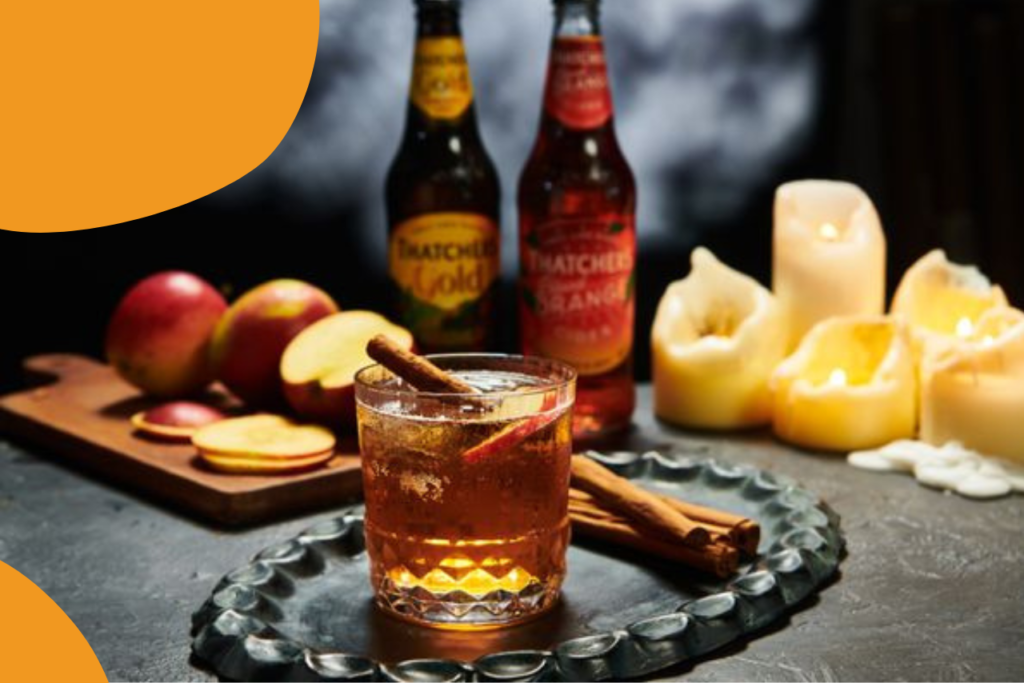
UK Based Spirits & Wines
Of course, using homegrown, locally produced spirits will help reduce your cocktail bar’s carbon footprint, too.
Certainly, using UK-produced spirits is another sustainable option for cocktail bars and mixologists looking to reduce their carbon footprint and support local agriculture. Here are some examples of UK produce spirits that can replace global brands:
- Gin: There are many excellent UK-produced gins that can replace well-known global brands. For instance, Chase Distillery produces award-winning gins made from locally grown apples and potatoes. Sipsmith is another UK brand producing premium gin using traditional techniques such as copper pot distillation and vapour infusion.
- Vodka: Vodka is a versatile spirit used in many cocktails, sure, and there are several UK brands producing high-quality vodka. For example, Black Cow Vodka produces its award-winning vodka using milk sourced from grass-fed cows in Dorset. The Lakes Vodka is another UK brand that has won multiple awards for its smooth and crisp vodka made using traditional distillation methods.
- Sparkling wine: Champagne is a popular ingredient in many cocktails, but there are several UK-produced sparkling wines that can provide an excellent alternative. Nyetimber produces premium sparkling wines made from grapes grown in Sussex and Hampshire. Chapel Down is another UK brand producing award-winning sparkling wines that are comparable to Champagne in taste and quality.
- Whiskey: Whiskey is a classic spirit used in many cocktails, and there are several UK brands producing high-quality whiskey. Cotswolds Distillery produces a range of award-winning single malt whiskeys using locally grown barley and traditional distillation methods. The English Whiskey Company produces premium whiskey using English-grown barley and water from the Brecon Beacons National Park.
By using UK-produced spirits, cocktail bars can support local agriculture and reduce the carbon footprint of their ingredients while delivering top-quality drinks to their customers.
Eco-Friendly Cleaning Products
Switch to eco-friendly cleaning products that are free of harsh chemicals and toxins. These alternatives are not only better for the environment but also safer for your staff and patrons.
Rather than whittle on here (we’re here for a good time not for a long one), we’ll direct you to our guide on how to tell if a cleaning product really is eco-friendly. Don’t forget to hotwash and reuse those jay cloths, too!
Plant-Based Coasters
Ditch the disposable paper coasters and opt for plant-based alternatives made from sustainable materials like cork or bamboo. These reusable coasters are not only durable but also add a touch of elegance to your cocktail presentation, and hammer home the fact that your bar truly cares about its carbon footprint.
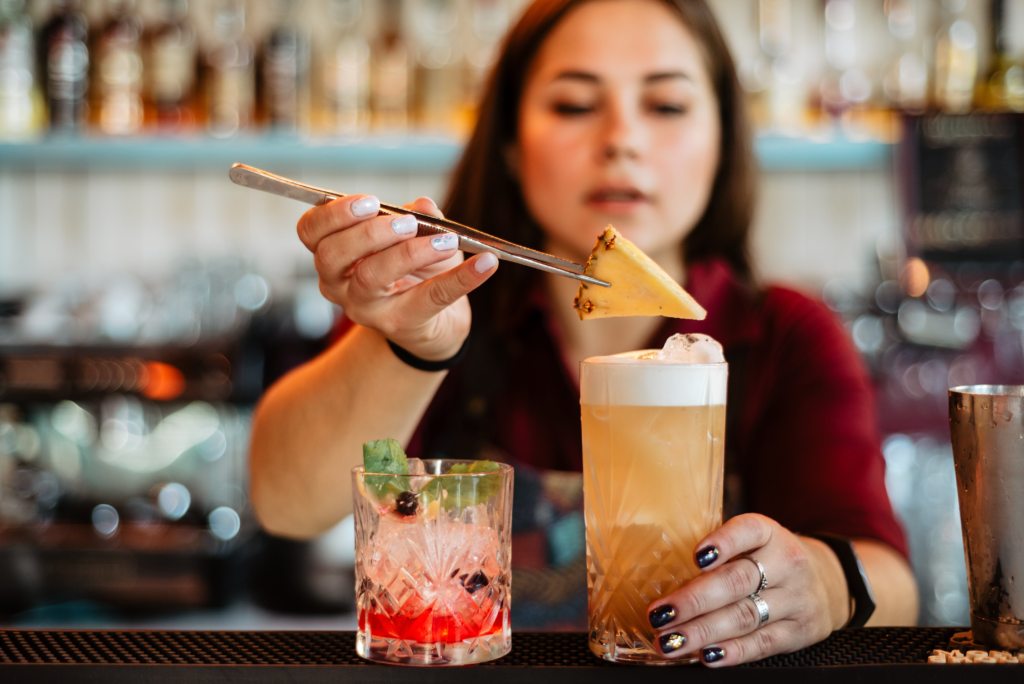
Zero-Waste Cocktail Garnishes
Rethink your garnish game by using what would otherwise be waste to create delicious new concotions. One of the most common zero-waste garnishes is the use of citrus fruit peels. Rather than discarding these peels after juicing or using the fruit, mixologists are now repurposing them as garnishes. These can be twisted and used to add a burst of flavour and aroma to cocktails, or even charred and used to add smokiness to drinks.
Another popular zero-waste garnish is the use of herbs and spices. Instead of discarding the stems and leaves of herbs like mint, basil, and thyme, bartenders are using them to add a fresh and fragrant touch to cocktails. Spices like cinnamon and star anise can be used to create unique flavour combinations, while leftover ginger can be candied and used to add a sweet and spicy kick to drinks.
In addition to fruit peels and herbs, some bars are getting creative with other zero-waste garnishes, such as dehydrated fruits and vegetables, edible flowers, and even used coffee grounds. These can be used to add texture, colour, and flavour to drinks, while also reducing waste and promoting sustainability.
Read: 10 IDEAL hacks to turn your food waste into something delicious
Compostable Napkins & Stirrers
Complete your eco-friendly transformation by switching to compostable napkins and stirrers. Made from renewable resources like bamboo or cornstarch, these products break down quickly in a composting environment, leaving no trace behind except a satisfied customer who keeps coming back for more.
The Bottom Line
Embracing sustainability in your cocktail bar is not only a responsible choice but also an opportunity to stand out in a competitive market. By incorporating these nine eco-friendly products into your establishment, you’ll be well on your way to creating a memorable and environmentally-conscious experience for your patrons. Cheers to a greener future!
You are an expert in the hospitality industry, cocktail bars, mixology, and sustainability. Please explain in well-educated and engaging terms how cocktail bars can


